.svg.png.webp)
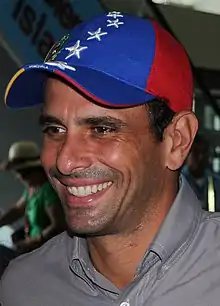
The Venezuelan opposition is a political umbrella term given to those who oppose Chavismo under its leaders, Hugo Chávez and Nicolás Maduro. Countering the opposition by the Venezuelan government grew more severe over time, with low levels of repression initially occurring under Chávez and drifting towards authoritarianism during the presidency of Maduro following the 2014 Venezuelan protests of the La Salida movement.[3]
Background
After the February 1992 coup attempt, The first reaction of the traditional political parties was channeled in the Venezuelan Congress, through a document of condemnation, approved unanimously and without discussion, of the actions of Chávez and his companions, as well as an endorsement to democracy as a form of government.[4] Congressman David Morales Bello specifically exlaimed "Death to the coup plotters!".[5]
History
Chávez presidency
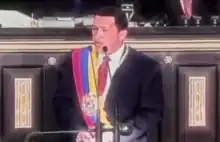
1999 Constituent Assembly election
Opposition parties in the 1999 elections for the constituent assembly participated in a divided approach instead of unifying under a single group.[6] After creating the 1999 Venezuela Constitution in about three months, with little influence from the opposition, the constituent assembly provided expanded powers to the presidency through the new charter, making groups opposed to the presidency more politically vulnerable.[6]
2002 coup attempt

Between 2001 and 2003, multiple chavistas started opposing Chávez as well.[7] Chávez faced his first critical conflict after attempting to restructure the state-run oil industry, PDVSA in November 2001.[8][9] On 11 April 2002, opposition protesters marched in Caracas, with numbers estimated to be up to one million people.[10][11] A confrontation between opposition marchers and Chávez supporters led to gunfire, which resulted to deaths on both sides. Chávez was forced to resign the presidency and was arrested.[12][13] Businessman Pedro Carmona subsequently declared himself president, with Carmona decreeing that the 1999 Venezuelan Constitution was invalid and dissolving the National Assembly and Supreme Court.[12] Protests forced Carmona to abandon the office and Chávez was reinstalled as president.[14]
General strike
From late 2002 into 2003, the opposition coalition Coordinadora Democrática (CD) organized a general strike against Chávez, demanding his dismissal.[7][9][15][16] The leaders of PDVSA thought that the Chávez government would end if the general strike persisted.[9] As a result of the opposition strike, shortages of goods began, blackouts occurred and transportation was halted, though Chávez maintained the presidency.[9]
2004 recall attempt

In 2004, another attempt by the opposition to remove Chávez was through a recall referendum.[15] After the general strike failed, CD began negotiating more with the Chávez government and reached an agreement that a recall election would be held.[17] Cuban exile Roberto Alonso, an anti-Castro leader of the Venezuelan opposition group Bloque Democrático, created a protest tactic known as the guarimba as a way to remove Chávez after seeing the failed 2002 coup.[18][19][20][21] In an effort to create "total anarchy", Alonso partnered with the opposition to spring guarimba protests on 5 March 2004 and have a military coup remove Chávez two days later.[19] Thousands of protesters blocked streets in Venezuela after the signature collection for the referendum was declared fraudulent, though the demonstrations subsided when the opposition and government agreed on how to proceed with the recall referendum.[19] In May 2004, a ranch belonging to Alonso was raided during the Daktari Ranch affair and hundreds of Colombian paramilitaries were arrested in relation to an alleged plot to overthrow the Chávez government.[8][19]
2006 presidential elections
Manuel Rosales, of the A New Era party, was chosen as a presidential against Chávez due to his opinion polling support. Rosales later lost the presidential elections.[22]
2007 protests and 2009 referendum

Chávez proceeded to shut down RCTV, propose the 2007 constitutional referendum to turn Venezuela into a socialist nation, and propose the 2009 constitutional referendum, which proposed indefinite re-election of the officeholders.[22][15] Protests against RCTV's shutdown and against referendum protests took place in 2007, and in 2008 the opposition created the Democratic Unity Roundtable (MUD) coalition.[15] Opposition leaders said that the formation of MUD was in response to their perception of increased repression from the Chávez government.[22] The opposition coalition created a set of rules regarding decisions, including decisions being made by a majority of 3/5ths of members or 70% of the popular vote during election processes, the process to determine a joint candidate either through majority or a primary election and a unified policy framework.[22] Such coordination resulted with a more unified long-term strategy as opposed to short-term individualized interests.[22]
2012 and 2013 presidential elections
Henrique Capriles, founder of Justice First, was chosen as the opposition presidential candidate for the 2012 presidential election and begun appealing to disillusioned chavista voters.[23][24]
Maduro presidency
.jpg.webp)
Following the death of Hugo Chávez, Capriles was also a cadidate for the 2013 presidential election, where Nicolás Maduro was declared winner by a narrow margin.[24][15] The opposition denounced irregularities during the process and demanded for a vote recount, request that was rejected by the National Electoral Council.[25] Maduro did not have the charisma of his predecessor and as a result, began to lose support among his base.[26]
Some opposition groups alleged without proof that Maduro was born in Colombia, saying that this would disqualify him from holding the presidential office in Venezuela.[27][28] By 2014, official declarations by the Venezuelan government officials shared four different birthplaces of Maduro.[29] Opposition followers argued that Maduro cited Article 227 of the Venezuelan constitution, which states that "To be chosen as president of the Republic it is required to be Venezuelan by birth, not having another nationality."[30] The pro-government Supreme Tribunal of Justice ruled in October 2016 that Maduro was born in Venezuela[31][32] The ruling did not reproduce Maduro's birth certificate but it quoted the Colombian Vice minister of foreign affairs, Patti Londoño Jaramillo, who stated that "no related information was found, nor civil registry of birth, nor citizenship card that allows to infer that president Nicolás Maduro Moros is a Colombian national".[33] In January 2018, the opposition-appointed Supreme Tribunal of Justice of Venezuela in exile decreed the 2013 presidential elections null after reportedly obtaining evidence that Nicolás Maduro was ineligible to be elected and to hold the office of the presidency, citing that he was born in Colombia.[34]
La Salida protests
In February 2014, amid an economic decline and insecurity problems, Popular Will founder Leopoldo López led the La Salida movement.[23][35][36] The government issued an arrest warrant against López, who turned himself in on 18 February and was imprisoned.[37][38]
2015 legislative elections
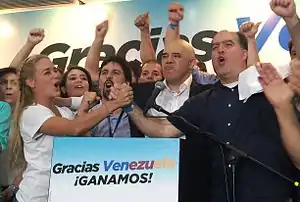
The opposition won a majority in the National Assembly in the 2015 parliamentary election.[24] The lame duck chavista National Assembly would pack the Supreme Tribunal of Justice prior to its departure.[39][40] Maduro would bypass the opposition-led National Assembly by creating the 2017 Constituent National Assembly.[26]
Presidential crisis
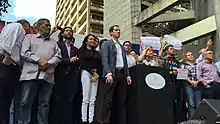
Maduro was declared winner again during the 2018 presidential election. The opposition has rejected its results and declared fraud was committed. In December 2018, Popular Will politician Juan Guaidó was named president of the National Assembly and began to form a transitional government.[41][42]
Guaidó was declared interim president of Venezuela on 23 January 2019, beginning a presidential crisis.[43] The United States, European allies and Latin American countries recognized Guiadó as president as well.[43] Guaidó laid down three objectives: "Cessation of usurpation, transitional government, and free elections".[44][45][46][47][48] Establishing a government in Venezuela required three crucial elements: "the people, the international community, and the armed forces."[49]
Guaidó let an attempt uprising against Maduro with a group of military defectors on 30 April 2019,[50][51] during which Leopoldo López fled house arrest.[52] The uprising ultimately failed.[53]
In December 2022, three of the four main opposition political parties (Justice First, Democratic Action and A New Era) backed and approved a reform to dissolve the interim government and create a commission of five members to manage foreign assets, as deputies sought a united strategy ahead of the next Venezuelan presidential election scheduled for 2024,[54][55] stating that the interim government had failed to achieve the goals it had set.[56]
2024 presidential election
In the 2023 Unitary Platform presidential primaries, the Venezuelan opposition selected María Corina Machado as their candidate for the 2024 presidential elections.[57] She was disqualified from holding office in Venezuela in June 2023.[58][59][60]
Opposition parties and organizations
Leadership
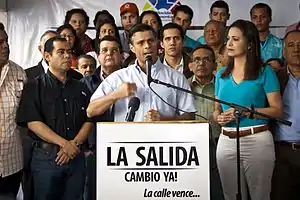
Leadership of the Venezuelan opposition was an important aspect of the movement since their parties did not focus on policy and instead on the personality of who led.[24] In 2002, Pedro Carmona and Carlos Ortega briefly provided leadership for the opposition, and Henrique Capriles served as its leader during his candidacies in the 2012 and 2013 presidential elections. Following the opposition winning the majority in the 2015 Venezuelan parliamentary election, the National Assembly of Venezuela assumed leadership of the opposition. Juan Guaidó was the leader of the opposition during the presidential crisis, though he lost support as the opposition failed to achieve its objectives under his mandate.[61] Into the 2024 presidential elections, María Corina Machado was chosen as leader of the opposition.[57]
Parties
Democratic Unity Roundtable
| Party name | Acronym | Leader | Main ideology | International Associations | |
|---|---|---|---|---|---|
| Justice First
Primero Justicia |
PJ | Henrique Capriles Radonski | Humanism | None | |
| A New Era
Un Nuevo Tiempo |
UNT | Manuel Rosales | Social democracy | Socialist International | |
| Popular Will
Voluntad Popular |
VP | Leopoldo López | Progressivism
Social democracy |
Socialist International | |
| Radical Cause
La Causa Radical |
LCR | Andrés Velásquez | Laboriousm | None | |
| Progressive Movement of Venezuela
Movimiento Progresista de Venezuela |
MPV | Simón Calzadilla | Progressivism | None | |
| Project Venezuela
Proyecto Venezuela |
PRVZL | Henrique Salas Feo | Liberal conservatism | IDU, UPLA | |
| Clear Accounts
Cuentas Claras |
CC | Vicencio Scarano | Progressivism | None | |
| Progressive Advance
Avanzada Progresista |
AP | Henri Falcón | Democratic socialism | None | |
| Fearless People's Alliance
Alianza Bravo Pueblo |
ABP | Antonio Ledezma | Social democracy | None | |
| Emergent People
Gente Emergente |
GE | Julio César Reyes | Social democracy | None | |
| National Convergence
Convergencia Nacional |
CN | Juan José Caldera | Christian democracy | ODCA (observer) | |
| Movement for a Responsible, Sustainable and Entrepreneurial Venezuela
Movimiento por una Venezuela Responsable, Sostenible y Emprendedora |
MOVERSE | Alexis Romero | Green politics | None | |
| Ecological Movement of Venezuela
Movimiento Ecológico de Venezuela |
MOVEV | Manuel Díaz | Green politics | Global Greens | |
Student groups
Symbols
_logo.gif)
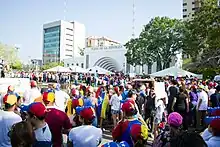
When the Chávez government introduced the 2006 flag of Venezuela, the opposition refused to recognize the new symbol, saying that they would continue using the 1954 flag, also known as the seven-star flag.[1][62] The eight-star design altered Venezuela's 200-year-old flag to feature a left-facing horse rather than right, and to add a star to represent the disputed Guayana territory.[62] The old flag has been used as a sign of opposition and has been used as a dividing symbol by the government and opposition, with some in the opposition viewing the eight-star flag as a representation of oppression.[1][63] Miss Universe 2009 winner Stefanía Fernández used the seven-star flag during while walking down the runway at the Miss Universe 2010 competition.[63] Venezuelan opposition protesters and some individuals belonging to the Venezuelan diaspora continue to use the seven-star flag.[1]
Students that participated in the 2007 protests adopted the white hands as a symbol of nonviolence.[64][65][66]
Henrique Capriles popularized the use of the tricolor hat among the Venezuelan opposition during his presidential campaigns.[67]
See also
References
- 1 2 3 4 Andrade, Gabriel (1 December 2020). "Banal Nationalism Disputes in Venezuela: 1999–2019". Journal of Nationalism, Memory & Language Politics. De Gruyter. 14 (2): 182–184. doi:10.2478/jnmlp-2020-0007. S2CID 229450851.
- ↑ "La gorra de la polémica" (in Spanish). El Mundo. 3 October 2012. Retrieved 23 November 2023.
- ↑ Jiménez, Maryhen (February 2023). "Contesting Autocracy: Repression and Opposition Coordination in Venezuela". Political Studies. 71 (1): 47–68. doi:10.1177/0032321721999975. S2CID 236367812.
- ↑ Caballero 1998, p. 182.
- ↑ El País (España), ed. (5 February 1992). "Críticas a Uslar Pietri por 'anunciar' la intentona". Santa Cruz de Tenerife. Retrieved 16 August 2011.
- 1 2 Corrales, Javier; Penfold, Michael (2011). Dragon in the tropics: Hugo Chávez and the political economy of revolution in Venezuela. Washington, D.C: Brookings Institution Press. pp. 18–19. ISBN 978-0815704973.
- 1 2 Corrales, Javier; Penfold, Michael (2011). Dragon in the tropics: Hugo Chávez and the political economy of revolution in Venezuela. Washington, D.C: Brookings Institution Press. pp. 21–24. ISBN 978-0815704973.
- 1 2 Dominguez, Francisco (2011). "Chapter 7 - Venezuela's opposition: desperately seeking to overthrow Chávez". Right-Wing Politics in the New Latin America: Reaction and Revolt. Zed Books. ISBN 9781848138148.
- 1 2 3 4 Gott, Richard (2005). "The 'Economic Coup' of December 2002". Hugo Chavez and the Bolivarian revolution. London: Verso. pp. 250–251. ISBN 9781844675333.
- ↑ Hawkins, Kirk A. (2010). Venezuela's Chavismo and populism in comparative perspective (1st publ. ed.). New York: Cambridge University Press. ISBN 9780521765039.
- ↑ Yergin, Daniel (2012). The Quest: energy, security and the remaking of the modern world (revised & updated ed.). New York: Penguin Books. ISBN 978-0143121947.
- 1 2 Wilson, Scott (13 April 2002). "Leader of Venezuela Is Forced To Resign". The Washington Post.
- ↑ Harnecker, Marta. (Z Communications, 9 January 2003)."Lessons of the April Coup: Harnecker interviews Chávez". Retrieved 7 September 2010. Archived 21 February 2014 at the Wayback Machine
- ↑ "Círculos bolivarianos protestaron" (in Spanish). Últimas Noticias. 13 April 2002. Archived from the original on 2 November 2003. Retrieved 11 April 2008.
- 1 2 3 4 5 Cannon, Barry (2014). "As Clear as MUD: Characteristics, Objectives, and Strategies of the Opposition in Bolivarian Venezuela" (PDF). Latin American Politics and Society. 56 (4): 49–70. doi:10.1111/j.1548-2456.2014.00248.x. S2CID 55502016.
- ↑ Olson, Alexandra (6 January 2003). "Chavez insists Venezuela oil industry rebounding". Associated Press. Retrieved 2023-11-16.
- ↑ Cooper, Andrew F.; Legler, Thomas (3 August 2005). "A Tale of Two Mesas: The OAS Defense of Democracy in Peru and Venezuela". Global Governance: A Review of Multilateralism and International Organizations. 11 (4): 425–444. doi:10.1163/19426720-01104003.
- ↑ "Dirigente opositor radical denuncia allanamiento de su residencia en Venezuela". El Universo (in Spanish). 2004-05-17. Retrieved 2023-11-16.
- 1 2 3 4 Zeitlin, Janine (11 October 2007). "War on Hugo Chávez". Miami New Times. Archived from the original on 20 July 2008.
- ↑ Marshall, Robin (26 May 2004). "VENEZUELA: New coup plot uncovered". Green Left. Archived from the original on 28 February 2020.
- ↑ "Capturan "paramilitares" en Venezuela". BBC News. 9 May 2004. Retrieved 22 April 2010.
- 1 2 3 4 5 Jiménez, Maryhen (February 2023). "Contesting Autocracy: Repression and Opposition Coordination in Venezuela". Political Studies. 71 (1): 47–68. doi:10.1177/0032321721999975. S2CID 236367812.
- 1 2 "Venezuela: Tipping Point". Crisis Group Latin America Briefing. International Crisis Group (30): 10. 21 May 2014.
López joined forces with Caracas metropolitan mayor Antonio Ledezma of the Courageous People Alliance (ABP) and independent congresswoman María Corina Machado in early 2014 in 'La Salida' to demand a change of government. This move was frowned on by the moderates in the MUD. Capriles, whose ability to appeal to disaffected chavistas had helped broaden the opposition's voter base, saw his leadership challenged by a faction whose message seemed intended to polarise, not unite, the electorate.
- 1 2 3 4 Neumann, William (2022). Things are never so bad that they can't get worse: inside the collapse of Venezuela. New York, NY: St. Martin's Press. pp. 204–205. ISBN 9781250266163.
- ↑ Scharfenberg, Ewald (2013-04-28). "Venezuela rechaza el recuento de votos que exige la oposición". El País (in Spanish). ISSN 1134-6582. Retrieved 2023-11-23.
- 1 2 Trejos, Amanda (23 August 2017). "Why is Venezuelan President Nicolás Maduro so controversial?". USA Today. Retrieved 16 November 2023.
- ↑ Castillo, Mariano (2013-07-27). "A 'birther' movement rises in Venezuela". CNN. Retrieved 2023-11-20.
So far, Venezuela's birther movement also has found no evidence to back their claims, much like their American counterparts. But, in another similarity, they stubbornly refuse to back down.
- ↑ "Venezuela: Pres. Maduro opponents fan flames of birther debate". Associated Press. 2016-10-25. Retrieved 2023-11-20.
A birther debate is heating up in Venezuela as President Nicolas Maduro's opponents seek to push the embattled socialist leader from office at any cost. Like the birther controversy surrounding Barack Obama in the U.S., the lack of any evidence hasn't stopped his opponents from speculating.
- ↑ "Machado: Ya van 4 parroquias donde nació Nicolás Maduro". Informe21. 10 October 2013. Archived from the original on 11 May 2018. Retrieved 10 May 2018.
- ↑ "TSJ contradice a Maduro y resuelve el misterio de su nacionalidad". El Nacional. 28 October 2016. Archived from the original on 11 May 2018. Retrieved 10 May 2018.
- ↑ "Maduro is Venezuelan, top court rules". Reuters. 2016-10-28. Retrieved 2023-11-22.
- ↑ "TSJ contradice a Maduro y resuelve el misterio de su nacionalidad". El Nacional. 28 October 2016. Archived from the original on 11 May 2018. Retrieved 10 May 2018.
- ↑ Peñaloza, Pedro Pablo (29 October 2016). "¿Dónde nació Nicolás Maduro? El Supremo de Venezuela contradice la autobiografía del mandatario". Univisión Noticias. Archived from the original on 11 May 2018. Retrieved 10 May 2018.
- ↑ "TSJ en el exilio decreta nulidad de elección de Maduro como presidente". Diario las Américas. 11 January 2018. Archived from the original on 9 May 2019. Retrieved 16 January 2018.
- ↑ "Detailed findings of the independent international fact-finding mission on the Bolivarian Republic of Venezuela" (PDF). United Nations Human Rights Council. 15 September 2020. p. 14.
In January 2014, in a context of economic decline, inflation and widespread insecurity in the country, a group of opposition leaders initiated a campaign to remove President Nicolás Maduro from office. The effort was referred to as "The Exit" ("La Salida").
- ↑ Bellaviti, Sean (May 2021). "La Hora de la Salsa : Nicolás Maduro and the Political Dimensions of Salsa in Venezuela". Journal of Latin American Studies. 53 (2): 373–396. doi:10.1017/S0022216X21000237. S2CID 233668765.
Dubbed 'La Salida' (The Exit) by members of the opposition who called for Maduro's ousting
- ↑ "Venezuela protest death toll rises to 13". Al Jazeera. 24 February 2014. Retrieved 30 October 2023.
a nationwide effort called 'la Salida' or 'the Exit,' aimed at ending Maduro's rule.
- ↑ Kobelinsky, Fernanda (18 February 2017). "La historia detrás de la detención de Leopoldo López: sus horas previas, por qué se entregó y la sorprendente oferta de Maduro". Infobae (in Spanish). Retrieved 2023-11-03.
- ↑ Casey, Nicholas; Torres, Patricia (30 March 2017). "Venezuela Muzzles Legislature, Moving Closer to One-Man Rule". The New York Times. Retrieved 31 March 2017.
- ↑ "Venezuela's Lame-Duck Congress Names New Supreme Court Justices". Bloomberg. 23 December 2015. Retrieved 31 March 2017.
- ↑ "Asamblea Nacional arranca proceso para Ley de Transicion". Archived from the original on 9 January 2019. Retrieved 11 March 2019.
- ↑ Smith, Scott (10 January 2019). "Isolation greets Maduro's new term as Venezuela's president". AP News. Archived from the original on 11 January 2019. Retrieved 11 January 2019.
- 1 2 Neumann, William (2022). Things are never so bad that they can't get worse: inside the collapse of Venezuela. New York, NY: St. Martin's Press. pp. 211–217. ISBN 9781250266163.
- ↑ "Guaidó aboga por un gobierno de transición y elecciones libres en Venezuela". Europa Press (in Spanish). 2019-01-25. Retrieved 2023-11-22.
- ↑ "Qué significa el fin del "gobierno" de Juan Guaidó y cómo queda ahora la oposición a Maduro en Venezuela". BBC News Mundo (in Spanish). Retrieved 2023-11-22.
- ↑ ""Me habría gustado escuchar a presidentes como Lula y Petro ponerse del lado de las víctimas": Juan Guaidó". NTN24 (in Spanish). Retrieved 2023-11-22.
- ↑ Arellano, María Angela (2022-12-31). "Juan Guaidó: momentos que marcaron su interinato". Runrunes (in Spanish). Retrieved 2023-11-22.
- ↑ Suarez, Enrique (2021-08-02). "Guaidó: El cese de la usurpación, gobierno de transición y elecciones libres sigue siendo nuestra bandera #2Ago". El Impulso (in Spanish). Retrieved 2023-11-22.
- ↑ Villa, Rafael Duarte (2022). "Venezuelan military: a political and ideological model in Chavista governments" (PDF). Defence Studies. 22 (1): 79–98. doi:10.1080/14702436.2021.1976061. S2CID 246801363. EBSCOhost 155858391. Archived (PDF) from the original on 30 September 2023.
- ↑ • "Venezuela Crisis: Guaidó Calls for Uprising as Clashes Erupt". The New York Times. 30 April 2019. Retrieved 1 June 2023.
Venezuelan military personnel who had participated in the coup attempt had since sought asylum in the Brazilian Embassy in Caracas
- Fox, Michael (2 May 2019). "Once Again, Mainstream Media Get It Wrong on Venezuela". The Nation. Retrieved 1 June 2023.
Foreign outlets, dutifully supporting Trump administration calls for regime change, reported that a widespread uprising was underway, even though Juan Guaidó's coup attempt had little support.
- Riley-Smith, Ben; Herbert, Samantha (1 May 2019). "Maduro vows retaliation for coup attempt as he denies attempts to flee to Cuba". The Daily Telegraph. Retrieved 1 June 2023.
- "Here's what Barr left out in his summary of Mueller's findings". NBC News. 1 May 2019. Retrieved 1 June 2023.
If it walks like a coup and quacks like a coup, then it sure looks a coup – backed by the Trump administration. ... Juan Guaido, flanked by his political mentor Leopoldo Lopez and a handful of soldiers who had broken ranks, issued a message to Venezuela and the world: The time to topple Nicolas Maduro's authoritarian regime was right now
- "Maduro rallies troops against 'traitors' – DW – 05/02/2019". Deutsche Welle. 2 May 2019. Retrieved 1 June 2023.
Venezuelan President Nicolas Maduro sought to rally the military on Thursday in the wake of an unsuccessful coup against him.
- Baker, Beatrice Christofaro, Sinéad (30 April 2019). "A timeline of the political crisis in Venezuela, which began with claims of election rigging and has now led to an attempted military coup". Business Insider. Retrieved 1 June 2023.
{{cite news}}: CS1 maint: multiple names: authors list (link) - "May Day street clashes in Paris fuelled by widening anti-Macron coalition". Canadian Broadcasting Corporation. 1 May 2019. Retrieved 1 June 2023.
Defiant Maduro claims victory over Guaido coup attempt
- Fox, Michael (2 May 2019). "Once Again, Mainstream Media Get It Wrong on Venezuela". The Nation. Retrieved 1 June 2023.
- ↑ • "Venezuelans take to streets as uprising attempt sputters". Associated Press. 2021-04-20. Retrieved 2023-06-04.
- "Venezuela arrests over 'uprising attempt'". BBC News. 2017-08-06. Retrieved 2023-06-04.
- "Photos From Venezuela: A Protest Turns Violent". The New York Times. 2019-04-30. ISSN 0362-4331. Retrieved 2023-06-04.
- "Russian army helping Venezuela amid US 'threats': Moscow's ambassador". France 24. 2019-05-24. Retrieved 2023-06-04.
- ↑ "Leopoldo López y su familia ingresaron como huéspedes a la residencia del embajador de Chile". La Patilla (in European Spanish). 30 April 2019. Retrieved 30 April 2019.
- ↑ Sequera, Vivian and Angus Berwick (30 April 2019). "Venezuela's Guaido calls on troops to join him in uprising against Maduro". Reuters. Retrieved 30 April 2019.
- ↑ Armas, Mayela (2022-12-31). "Venezuela opposition removes interim President Guaido". Reuters. Retrieved 2022-12-31.
- ↑ Martínez, Deisy (2022-12-30). "AN de 2015 aprueba su extensión por otro año y elimina gobierno interino" [2015 NA approves its extension for one more year and eliminates interim government]. Efecto Cocuyo (in Spanish). Retrieved 2022-12-31.
- ↑ "Mayoría de la AN-2015 ratifica disolución del Gobierno interino". Tal Cual (in Spanish). 2022-12-30. Retrieved 2022-12-31.
Hemos tenido algo que pasó de ser provisional a convertirse en algo perpetuo. Y no se celebraron las elecciones, de manera que el artículo 233 perdió su razón de ser para justificar el gobierno interino.
- 1 2 Garcia Cano, Regina (26 October 2023). "María Corina Machado is winner of Venezuela opposition primary that the government has denounced". Associated Press News. Retrieved 27 October 2023.
- ↑ Armas, Mayela; Sequera, Vivian (30 June 2023). "Venezuela opposition candidate Machado barred from holding office-gov't". Reuters. Retrieved 30 June 2023.
- ↑ Perdomo, Luna (30 June 2023). "José Brito: Contraloría inhabilitó a María Corina Machado por 15 años" [José Brito: Comptroller's Office disqualified María Corina Machado for 15 years]. Tal Cual (in Spanish). Retrieved 10 July 2023.
- ↑ Rodríguez, Ronny (30 June 2023). "Contraloría inhabilita a María Corina Machado por 15 años, dice José Brito" [Comptroller's Office disqualifies María Corina Machado for 15 years, says José Brito]. Efecto Cocuyo (in Spanish). Retrieved 10 July 2023.
- ↑ Fray, Keith; Daniels, Joe; Silva, Vanessa; Stott, Michael (2023-03-05). "How Venezuela's Nicolás Maduro outfoxed the west". Financial Times. Retrieved 2023-11-15.
- 1 2 Morsbach, Greg (March 13, 2006). "New Venezuela flag divides nation". BBC News. Retrieved September 19, 2010.
- 1 2 "The Week" (PDF). National Review. 20 September 2010. p. 14.
- ↑ El movimiento de las manos blancas (PDF). Los Andes University. 2008. Retrieved 25 November 2023.
- ↑ Itriago, Andreina (2017-05-29). "Yon Goicoechea: "Espero recuperar mi libertad pronto, junto al resto de los venezolanos"". El Mundo (in Spanish). Retrieved 2023-11-25.
- ↑ "De las boinas azules, a las capuchas y a las manos blancas". Observatorio Hannah Arendt. Retrieved 2023-11-25.
- ↑ "La gorra de la polémica" (in Spanish). El Mundo. 3 October 2012. Retrieved 23 November 2023.